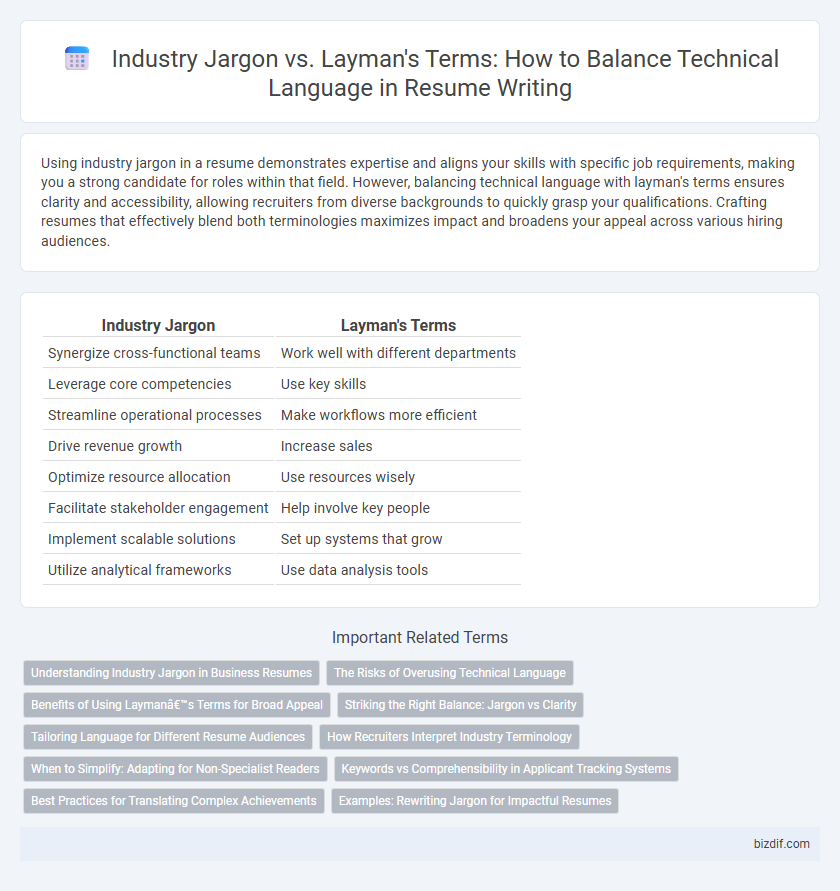Using industry jargon in a resume demonstrates expertise and aligns your skills with specific job requirements, making you a strong candidate for roles within that field. However, balancing technical language with layman's terms ensures clarity and accessibility, allowing recruiters from diverse backgrounds to quickly grasp your qualifications. Crafting resumes that effectively blend both terminologies maximizes impact and broadens your appeal across various hiring audiences.
Table of Comparison
| Industry Jargon | Layman's Terms |
|---|---|
| Synergize cross-functional teams | Work well with different departments |
| Leverage core competencies | Use key skills |
| Streamline operational processes | Make workflows more efficient |
| Drive revenue growth | Increase sales |
| Optimize resource allocation | Use resources wisely |
| Facilitate stakeholder engagement | Help involve key people |
| Implement scalable solutions | Set up systems that grow |
| Utilize analytical frameworks | Use data analysis tools |
Understanding Industry Jargon in Business Resumes
Understanding industry jargon in business resumes helps applicants demonstrate expertise and align their skills with sector-specific expectations. Using relevant terms like "ROI," "market segmentation," or "KPI" signals familiarity with business performance metrics, enhancing credibility with recruiters. Balancing jargon with clear explanations ensures accessibility while showcasing professional knowledge.
The Risks of Overusing Technical Language
Overusing industry jargon in resume writing can alienate recruiters unfamiliar with specialized terminology, reducing the clarity and impact of your qualifications. Excessive technical language may obscure key skills and achievements, making it difficult for applicant tracking systems (ATS) to properly parse the content. Balancing technical terms with layman's language ensures accessibility while showcasing expertise, increasing the chances of passing ATS filters and engaging human readers effectively.
Benefits of Using Layman’s Terms for Broad Appeal
Using layman's terms in a resume enhances clarity and accessibility, ensuring key skills and achievements resonate with a wider audience, including non-specialist recruiters. This approach reduces misunderstandings and highlights transferable skills, increasing the chances of passing applicant tracking systems that scan for simple, relevant keywords. Clear language boosts overall engagement, making a resume more impactful across various industries and experience levels.
Striking the Right Balance: Jargon vs Clarity
Striking the right balance between industry jargon and layman's terms in resume writing enhances both clarity and relevance, making your skills accessible to applicant tracking systems and human recruiters alike. Using key industry-specific terminology demonstrates expertise and aligns with job descriptions, while simplifying complex concepts ensures your achievements are easily understood beyond your field. Prioritize clear communication by integrating essential professional language that resonates with recruiters without overwhelming them with obscure jargon.
Tailoring Language for Different Resume Audiences
Tailoring language in resume writing requires balancing industry jargon with layman's terms to effectively communicate skills to different audiences. Hiring managers in specialized fields appreciate precise technical terms, while recruiters or HR professionals may prefer clear, universally understood language. Optimizing resumes by blending jargon and accessible vocabulary enhances clarity and improves the chances of passing applicant tracking systems and human reviews.
How Recruiters Interpret Industry Terminology
Recruiters assess industry jargon through the lens of clarity and relevance, prioritizing terms that demonstrate expertise while avoiding confusion. Overuse of specialized terminology can obscure key skills, leading to misinterpretation or overlooking of qualifications. Effective resumes balance technical language with accessible descriptions to ensure both industry insiders and generalist recruiters accurately evaluate candidates.
When to Simplify: Adapting for Non-Specialist Readers
Tailoring resumes for non-specialist readers involves simplifying industry jargon into clear, accessible language that highlights transferable skills and achievements. Using layman's terms ensures hiring managers from diverse backgrounds quickly grasp your qualifications without confusion. This adaptation increases the resume's impact by making technical expertise understandable and relevant to a broader audience.
Keywords vs Comprehensibility in Applicant Tracking Systems
Balancing industry jargon with layman's terms in resume writing enhances keyword optimization and comprehensibility for Applicant Tracking Systems (ATS). Using relevant keywords familiar to ATS algorithms ensures resumes rank higher during initial scans, while clear language improves human recruiter understanding. Strategically integrating specific technical terms with accessible descriptions maximizes both system recognition and reader engagement.
Best Practices for Translating Complex Achievements
Translate complex achievements into clear, concise layman's terms to ensure hiring managers from various industries understand your impact without confusion. Use industry jargon selectively and always accompany it with simple explanations or quantifiable results to demonstrate expertise and tangible success. Prioritize clarity and relevance to the job description, highlighting skills and accomplishments that directly relate to the role while avoiding overuse of technical language that may alienate non-specialist readers.
Examples: Rewriting Jargon for Impactful Resumes
Rewriting industry jargon into clear layman's terms enhances resume readability and broadens appeal to recruiters unfamiliar with specialized vocabulary. For example, replacing "leveraged synergistic solutions" with "worked collaboratively to improve efficiency" demonstrates skills effectively without confusion. Using concrete phrases like "increased sales by 20%" instead of "achieved KPI targets" creates impactful resumes that highlight measurable achievements.
Industry Jargon vs Layman’s Terms Infographic

 bizdif.com
bizdif.com